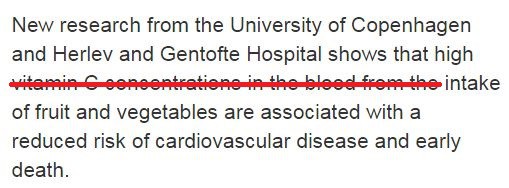I sometimes play a game on the Nutrition Diva Facebook page called “Spot the fallacy.” I post a link to a nutrition-related story and followers chime in, pointing out all the ways in which the science had been distorted or misreported. It’s always lots of fun.
Here are a couple of recent rounds of Spot the Fallacy:
- Chocolate lowers body fat!
- Why whole grains matter
- The problem with animal fats
- 10 foods you think are healthy
Usually, the problem is not with the research but with the way it’s being reported. But here’s a new category of face-palm science. Researchers take an interesting finding and then “drill down” to come up with a far less meaningful conclusion. Wanna play?
Here’s a link to the story: Vitamin C related to reduced risk of cardiovascular disease, early death. I’ll wait here while you read it.
Back? OK, so what did you see? Here’s what made me want to declare “Happy Hour” at 10 am.
The scientists analyzed dietary records of about 100,000 people and found that people who ate the most fruits and vegetables had a 20% lower risk of early death and a 13% lower risk of cardiovascular disease compared with those who ate the least.
To their credit, this correlation was not misreported as causation. The article doesn’t say that eating more fruits and vegetables will prevent heart disease or extend your lifespan. They are careful to use words like “related” and “associated” to describe the relationship between eating more salad and living longer.
The takeaway: Eat your vegetables and hope for the best. It might help and it can’t hurt.
But look what comes next: They also find that people who have more vitamin C in the blood due to a genetic variant also have reduced risks–although they don’t fare as well as vegetable eaters. And here’s what hits the newswire: It’s the Vitamin C in fruits and vegetables that makes them good for you:
Why? Why? Why?
Fruits and vegetables contain thousands of bioactive compounds, with cumulative and synergistic effects. How can you conclude that the benefits of eating more fruits and vegetables are likely due to the high blood levels of vitamin C that result?
At the end of the day, this research didn’t remotely merit a press release. But I wish they’d quit while they were ahead and simply published this:



